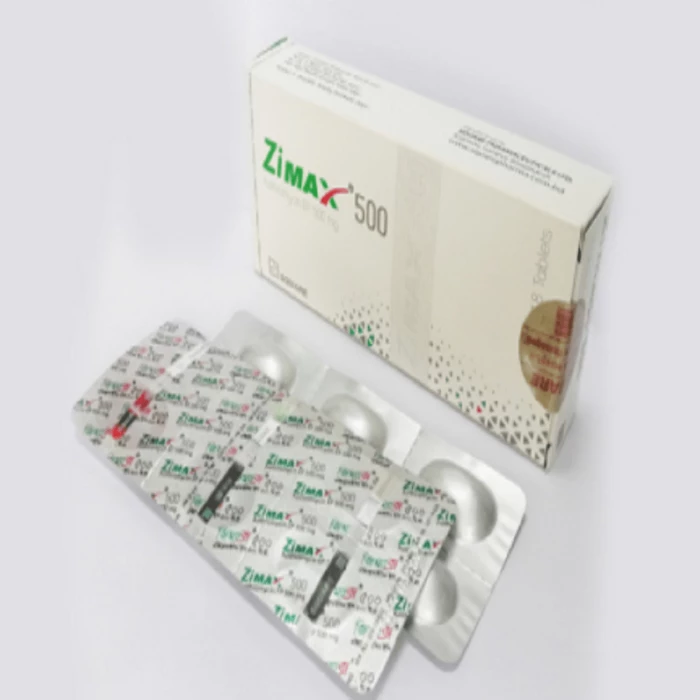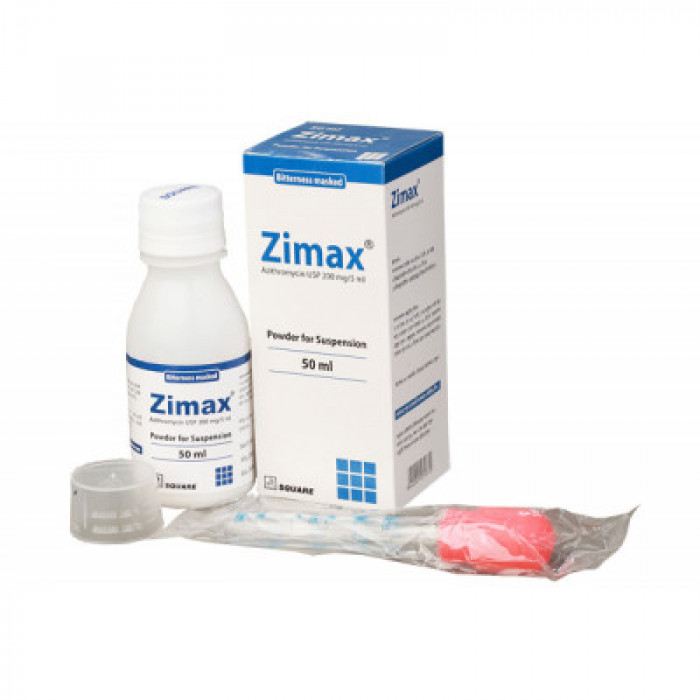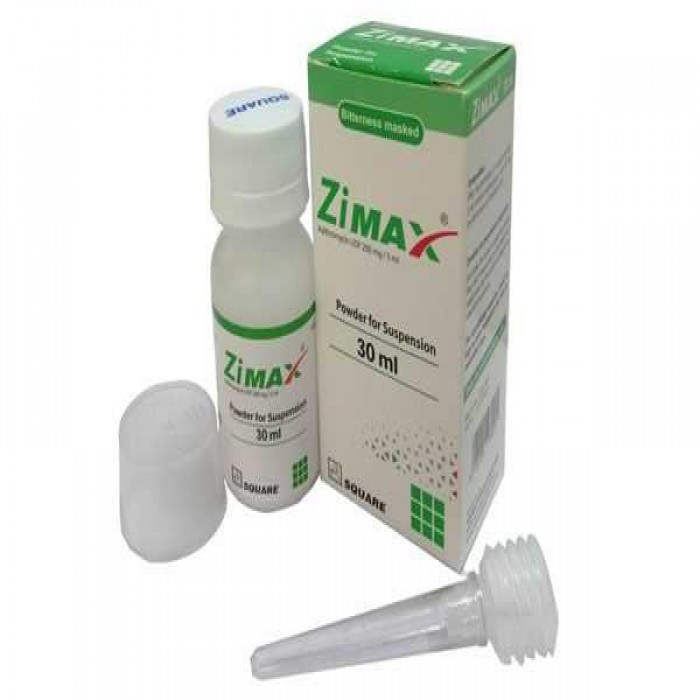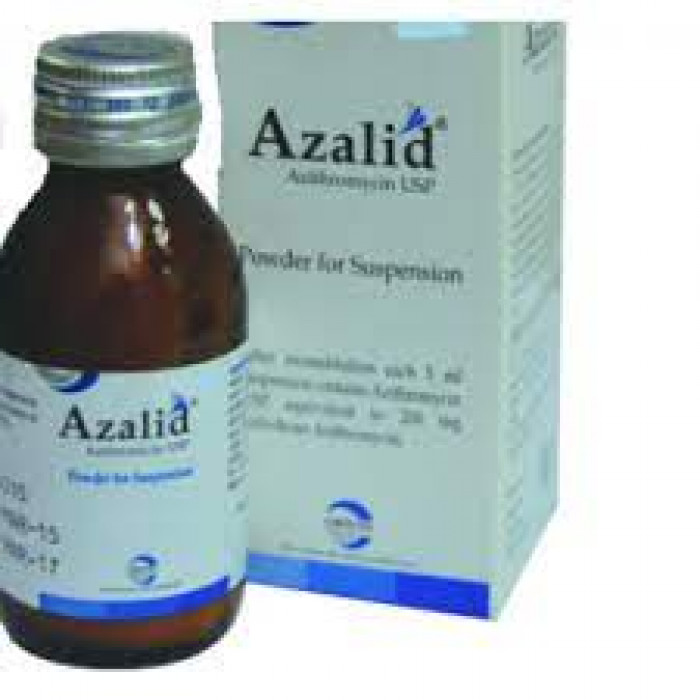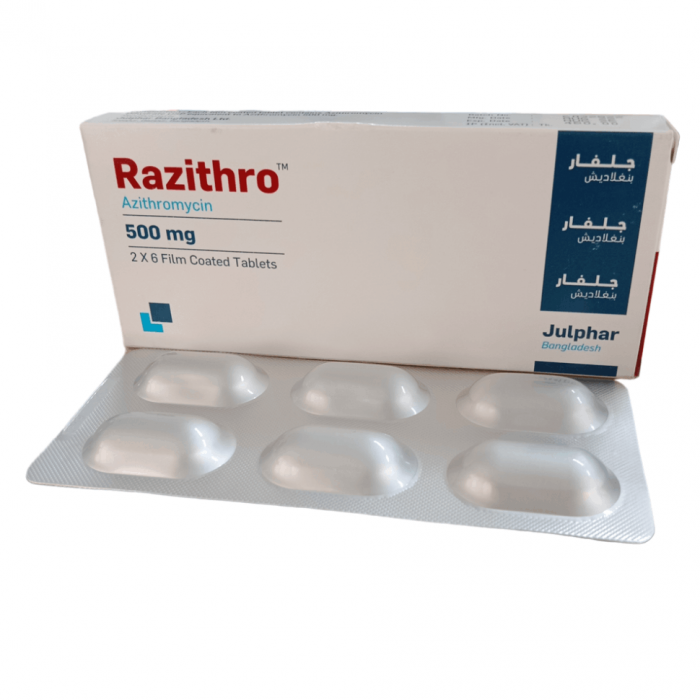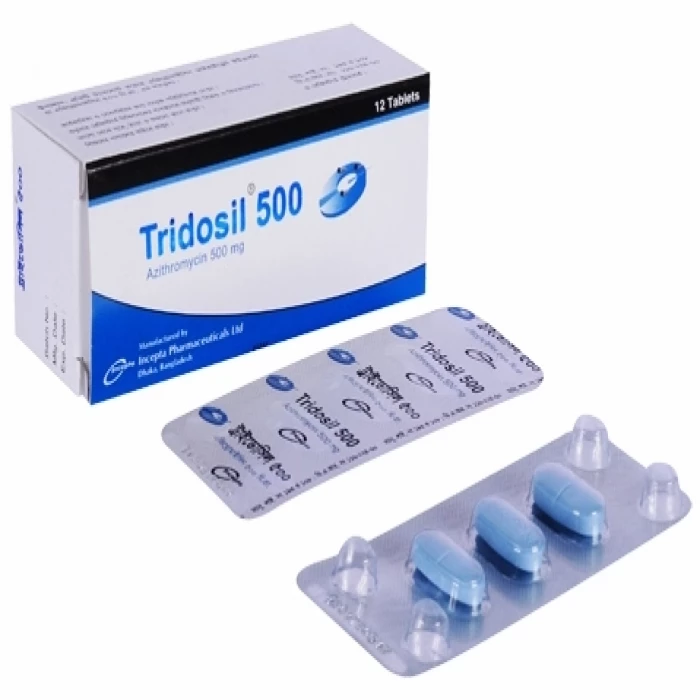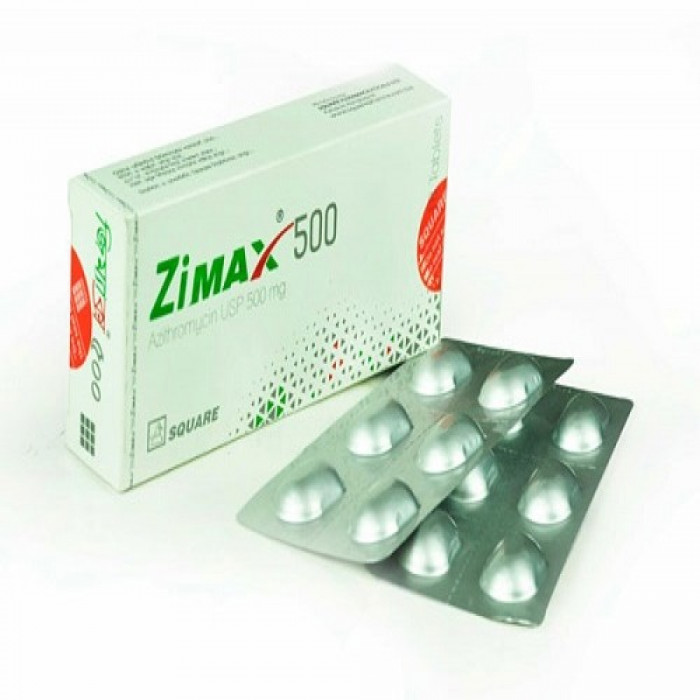
✔ 100% Authentic Product
👁️ Currently Viewing 18086
Azithrocin 500mg Tablet
Azithromycin, which is included in Azithrocin 500mg Tablet, is a kind of antibiotic known as a Macrolide antibiotic. It is used to treat mild to moderate susceptibility infections caused by bacteria and other microorganisms, including bronchitis, pneumonia, tonsillitis, sore throat, and sinusitis.
It is also indicated for the treatment of sexually transmitted diseases such as cervicitis (caused by organisms such as Chlamydia trachomatis/Neisseria gonorrhea).
📄Prescription Required
Discount
Price: ৳ 100
MRP:
৳
105
5%
Off

100% Genuine Products, Guaranteed

Safe & Secure Payments, Always

Fast, Secure & Efficient Delivery

Proper Packaging
 Cash on Delivery - All over Bangladesh
Cash on Delivery - All over Bangladesh Regular Delivery - 12-24 Hours, Dhaka City* Charge Tk.39-59
Regular Delivery - 12-24 Hours, Dhaka City* Charge Tk.39-59 Regular Delivery - 24-48 Hours, Other Cities* Charge Tk.99-110
Regular Delivery - 24-48 Hours, Other Cities* Charge Tk.99-110
 ফ্রি ডেলিভারিঃ - ৯৯৯ টাকা+ অর্ডারে, ঢাকা
শহরে
ফ্রি ডেলিভারিঃ - ৯৯৯ টাকা+ অর্ডারে, ঢাকা
শহরে ফ্রি ডেলিভারিঃ - ২৯৯৯ টাকা+ অর্ডারে, ঢাকার
বাহিরে
ফ্রি ডেলিভারিঃ - ২৯৯৯ টাকা+ অর্ডারে, ঢাকার
বাহিরে
100% Genuine Products, Guaranteed
Safe & Secure Payments, Always
Fast, Secure & Efficient Delivery
Proper Packaging
 Cash on Delivery - All over Bangladesh
Cash on Delivery - All over Bangladesh Regular Delivery - 12-24 Hours, Dhaka City* Charge Tk.39-59
Regular Delivery - 12-24 Hours, Dhaka City* Charge Tk.39-59 Regular Delivery - 24-48 Hours, Other Cities* Charge Tk.99-110
Regular Delivery - 24-48 Hours, Other Cities* Charge Tk.99-110 ফ্রি ডেলিভারিঃ - ৯৯৯ টাকা+ অর্ডারে, ঢাকা
শহরে
ফ্রি ডেলিভারিঃ - ৯৯৯ টাকা+ অর্ডারে, ঢাকা
শহরে ফ্রি ডেলিভারিঃ - ২৯৯৯ টাকা+ অর্ডারে, ঢাকার
বাহিরে
ফ্রি ডেলিভারিঃ - ২৯৯৯ টাকা+ অর্ডারে, ঢাকার
বাহিরে
✅ Description:
Azithrocin 500mg Tablet is a type of macrolide antibiotic used to treat bacterial infections in the respiratory system, skin, ear, and sexually transmitted infections. It works by inhibiting the production of essential proteins required for the growth of bacteria, thereby slowing down or killing them. It is important to note that Azithrocin 500mg Tablet does not treat viral infections like the flu or the common cold. It is crucial to take this medicine only on the advice of a doctor and to follow the prescribed dosage and schedule for the best results. Overconsumption of the drug can lead to unwanted side effects. Even if you feel better, it is necessary to complete the full course of medication, as Azithrocin 500mg Tablet is an antibiotic. The most common side effects of this medicine include diarrhea, nausea, vomiting, and indigestion. In rare cases, it can cause an allergic reaction such as rashes, itching, swelling, and breathing difficulties. If you experience severe allergic reactions, please consult your doctor immediately.
Safety Advices

Alcohol
UNSAFE
Azithrocin 500mg Tablet should not be taken until prescribed if you are taking alcohol. Keep your doctor informed if you drink alcohol

Pregnancy
CONSULT YOUR DOCTOR
There is insufficient information available about the use of Azithrocin 500mg Tablet during pregnancy. Therefore you should not use Azithrocin 500mg Tabletablet 5's during pregnancy unless explicitly advised by your doctor.

Breastfeeding
UNSAFE
Azithrocin 500mg Tablet is partially passed through the mother’s milk, therefore it should not be used if you are breastfeeding.

Driving
CAUTION
Azithrocin 500 does not usually affect your ability to drive.

Kidney
CONSULT YOUR DOCTOR
You should tell your doctor if you have kidney problems as your doctor may need to alter the normal dose.

Liver
Azithrocin 500mg Tablet should be used with caution in patients with liver disease. A dose adjustment of Azithrocin 500 may be needed. Please consult your doctor.
✔️ Uses of Azithrocin 500mg Tablet
- Treatment of Bacterial Infections
✔️ How Azithrocin 500mg Tablet works
Azithrocin 500 is an antibiotic. It works by preventing the synthesis of essential proteins required by bacteria to carry out vital functions. Thus, it stops the bacteria from growing and prevents the infection from spreading.
✔️ Side effects of Azithrocin 500mg Tablet
- Stomach Cramps
- Nausea
- Vomiting
- Diarrhoea
- Flatulence
- Dizziness, headache
- Numbness/pickling sensation
- Loss of appetite,
- Taste Disturbance
- Visual Disturbances
- Deafness
- Skin Rash
- Skin and soft tissue infections
- Urethritis and Cervicitis
- Pharyngitis/Tonsilitis
- Sinusitis
- Bronchitis
- Itching
- Joint pain
- Tiredness
- Weakness
- Abdominal pain
- Diarrhea
✔️ Quick Suggestions:
- Even if you feel better, do not miss any doses and complete the whole course of therapy. Stopping it too soon may cause the illness to resurface and become more difficult to cure.
- Take it an hour before or after eating.
- Antacids should not be used 2 hours before or after taking Azithrocin 500.
- Diarrhea may develop as a side effect, but it should subside once your treatment is through. If it does not stop or if you detect blood in your feces, contact your doctor.
- If you experience an itching rash, swelling of the face, throat, or tongue, or breathing difficulties while using Azithrocin 500, stop taking it immediately and notify your doctor.
✔️ Indication of Azithrocin 500mg Tablet
A bacterial infection occurs when dangerous germs enter, grow, and infect our bodies. It may target any region of the body and multiply swiftly. When you become infected with germs, you may develop nonspecific symptoms such as fever, chills, and exhaustion. Bacteria come in a variety of shapes, including spherical, rod, and spiral-shaped bacteria. Bacterial infections range in severity from simple ailments such as sore throats and ear infections to serious brain infections such as meningitis and encephalitis. Streptococcus, Staphylococcus, and E. coli are some of the dangerous bacteria that cause illnesses. A bacterial infection can infect anyone at any time. People with weakened immune systems or those using immunosuppressive medications, on the other hand, are more vulnerable to bacterial infection.
Azithrocin 500mg Tablet is an antibiotic used to treat bacterial infections of the nose, throat, tonsils, ears, lungs, skin, etc. It works by blocking the formation of proteins required for bacterial growth. Thus it prevents further bacterial growth and multiplication.
✔️ Pharmacology
Azithromycin can be taken orally without any protection from gastric acids because it is acid-stable. It gets absorbed quickly, especially on an empty stomach, and reaches peak concentration in 2.1 to 3.2 hours in adults. Due to its high concentration in phagocytes, it can easily reach the site of infection. During active phagocytosis, large amounts of azithromycin are released. Its tissue concentration can be over 50 times higher than in plasma due to ion trapping and high lipid solubility.
Azithromycin's long half-life allows a single large dose to maintain bacteriostatic levels in infected tissue for several days. After a single 500 mg dose, the plasma concentration of azithromycin declines in a polyphasic manner, with a mean clearance of 630 mL/min and a terminal half-life of 68 hours.
In terms of microbiology, azithromycin works by binding to the 50S ribosomal subunit of susceptible microorganisms, disrupting their protein synthesis process. However, it does not affect nucleic acid synthesis.
✔️ Dosage & Administration of Azithrocin 500mg Tablet
- For Adults, the recommended dose of azithromycin for various bacterial infections is 500 mg once daily orally for 3 days, or 500 mg once on the first day followed by 250 mg once daily on days 2-5 for 4 days. For sexually transmitted diseases caused by Chlamydia trachomatis, the recommended dose is 1 gram given as a single dose, or 500 mg once on the first day followed by 250 mg once daily for the next 2 days.
- In Children over 6 months, the recommended dose is 10 mg/kg body weight once daily for 3 days. If the child's body weight is 15-25 kg, 200 mg (1 teaspoonful) for 3 days is given. If the body weight is 26-35 kg, 300 mg (1½ teaspoonfuls) for 3 days is given, and for bodyweight 36-45 kg, 400 mg (2 teaspoonfuls) for 3 days is given.
- For Typhoid fever, the recommended dose of azithromycin is 500 mg (2½ teaspoonfuls) once daily for 7-10 days. It is important to follow the prescribed dosage and complete the course of treatment, even if symptoms improve, to avoid the development of antibiotic resistance.
✔️ Interaction
Azithrocin 500mg Tablet can interact with certain medications, such as anti-nausea drugs (domperidone), mental health medications (pimozide, amisulpride), anti-migraine medications (ergotamine, dihydroergotamine), anti-cholesterol medications (simvastatin), bladder weakness medication (tolterodine), and anti-gout/arthritis medication (colchicine), which may lead to serious side effects. There are no relevant drug-food interactions with Azithrocin 500mg Tablet, but it is advisable to avoid consuming alcoholic beverages as they can cause drowsiness and dizziness.
However, Azithrocin 500mg Tablet should not be prescribed to individuals with liver problems, muscle weakness (myasthenia gravis), heart rhythm disorder (arrhythmia), electrolyte imbalance (low levels of potassium or magnesium), or colitis (inflammation of the intestine).
✔️ Contraindications
Azithromycin is not recommended for those who are hypersensitive to Azithromycin or any other macrolide antimicrobial. Ergot subordinates and Azithromycin should not be taken together. Azithromycin is not recommended for people who have the hepatic disease.
✔️ Pregnancy & Lactation
Azithromycin's pregnancy category is B. Azithromycin has been shown in animal reproduction studies to be safe for babies. In pregnant women, there are no adequate and well-controlled considerations. Because animal generation ponders are not always predictive of human reaction, Azithromycin should be used during pregnancy only if better alternatives are not available. It is unknown whether Azithromycin is excreted in the breast drain. As a result, while administering Azithromycin to nursing mothers, extreme caution should be exercised.
✔️ Precautions & Warnings
- If you have liver problems, muscle problems, heart rhythm disorder, or electrolyte imbalance, inform your doctor before taking Azithrocin 500mg Tablet.
- It may cause diarrhea in rare cases, and if you experience watery or bloody diarrhea, stop taking it and contact your doctor. Do not take any anti-diarrheal medicine without consulting your doctor.
- The effects of Azithrocin 500mg Tablet on a developing fetus during pregnancy are not known, so consult your doctor if you are pregnant, planning to become pregnant, or breastfeeding.
- Do not take Azithrocin 500mg Tablet if you are allergic to azithromycin or other macrolide antibiotics.
- Inform your doctor if you are taking cholesterol-lowering drugs, anti-gout or anti-arthritis drugs, or medicine for treating overactive bladder.
- Azithrocin 500mg Tablet is not recommended for patients with pneumonia who are severely ill or have risk factors that make oral therapy unsuitable.
✔️ Storage Conditions
Keep in a dry place away from light and heat. Keep out of the reach of children.
⚠️Disclaimer:
At ePharma, we’re committed to providing accurate and accessible health information. However, all content is intended for informational purposes only and should not replace medical advice from a qualified physician. Please consult your healthcare provider for personalized guidance. We aim to support, not substitute, the doctor-patient relationship.







